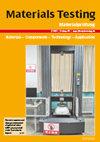Performance of conventional and wiper CBN inserts under various cooling conditions in hard turning of AISI 52100 steel
IF 3.5
4区 材料科学
Q2 MATERIALS SCIENCE, CHARACTERIZATION & TESTING
引用次数: 0
Abstract
Abstract Cryogenic cooling and minimum quantity lubrication (MQL) are regarded as effective green manufacturing techniques since they eliminate the excessive utilization of conventional cutting fluids (CCFs) that are known to have adverse impacts on both the environment and human health. Moreover, these methods have promising effects on surface integrity in machining hard-to-cut materials. This study investigates the impact of hybrid and cryogenic lubri-cooling methods on surface integrity (surface roughness, microhardness, and residual stresses) in hard turning of AISI 52100 bearing steel (62 HRC) with conventional and wiper CBN inserts. For that purpose, a precooling-based hybrid (a combination of precryogenic cooling of the workpiece and MQL) and direct cryogenic cooling techniques were used for comparison during the hard turning tests. The tests were carried out at a constant cutting speed (200 m/min), feed (0.1 mm∙rev−1), and depth of cut (0.1 mm) under dry, carbon dioxide (CO2), liquid nitrogen (LN2), CO2 + MQL, and LN2 + MQL conditions. The results show that hybrid lubri-cooling condition (CO2 + MQL) improved the surface quality and increased the compressive residual stresses at the machined surface when wiper inserts were employed. On the other hand, effective cooling under direct CO2 condition provided better surface integrity when machining with conventional inserts.硬车削 AISI 52100 钢时,各种冷却条件下传统 CBN 刀片和刮片 CBN 刀片的性能
摘要 低温冷却和最小量润滑 (MQL) 被认为是有效的绿色制造技术,因为它们避免了传统切削液 (CCF) 的过度使用,而众所周知,传统切削液对环境和人类健康都有不利影响。此外,这些方法对加工难切削材料时的表面完整性也有很好的效果。本研究探讨了混合冷却和低温润滑冷却方法对使用传统刀片和刮刀 CBN 刀片硬车削 AISI 52100 轴承钢(62 HRC)的表面完整性(表面粗糙度、显微硬度和残余应力)的影响。为此,在硬车削试验中使用了基于预冷的混合技术(工件预冷和 MQL 的组合)和直接低温冷却技术进行比较。试验在恒定的切削速度(200 米/分钟)、进给量(0.1 毫米∙rev-1)和切削深度(0.1 毫米)条件下,分别在干燥、二氧化碳(CO2)、液氮(LN2)、CO2 + MQL 和 LN2 + MQL 条件下进行。结果表明,混合润滑冷却条件(CO2 + MQL)改善了表面质量,并增加了使用雨刷刀片时加工表面的压缩残余应力。另一方面,在使用传统刀片加工时,直接 CO2 条件下的有效冷却可提供更好的表面完整性。
本文章由计算机程序翻译,如有差异,请以英文原文为准。
求助全文
约1分钟内获得全文
求助全文
来源期刊

Materials Testing
工程技术-材料科学:表征与测试
CiteScore
4.20
自引率
36.00%
发文量
165
审稿时长
4-8 weeks
期刊介绍:
Materials Testing is a SCI-listed English language journal dealing with all aspects of material and component testing with a special focus on transfer between laboratory research into industrial application. The journal provides first-hand information on non-destructive, destructive, optical, physical and chemical test procedures. It contains exclusive articles which are peer-reviewed applying respectively high international quality criterions.
 求助内容:
求助内容: 应助结果提醒方式:
应助结果提醒方式:


